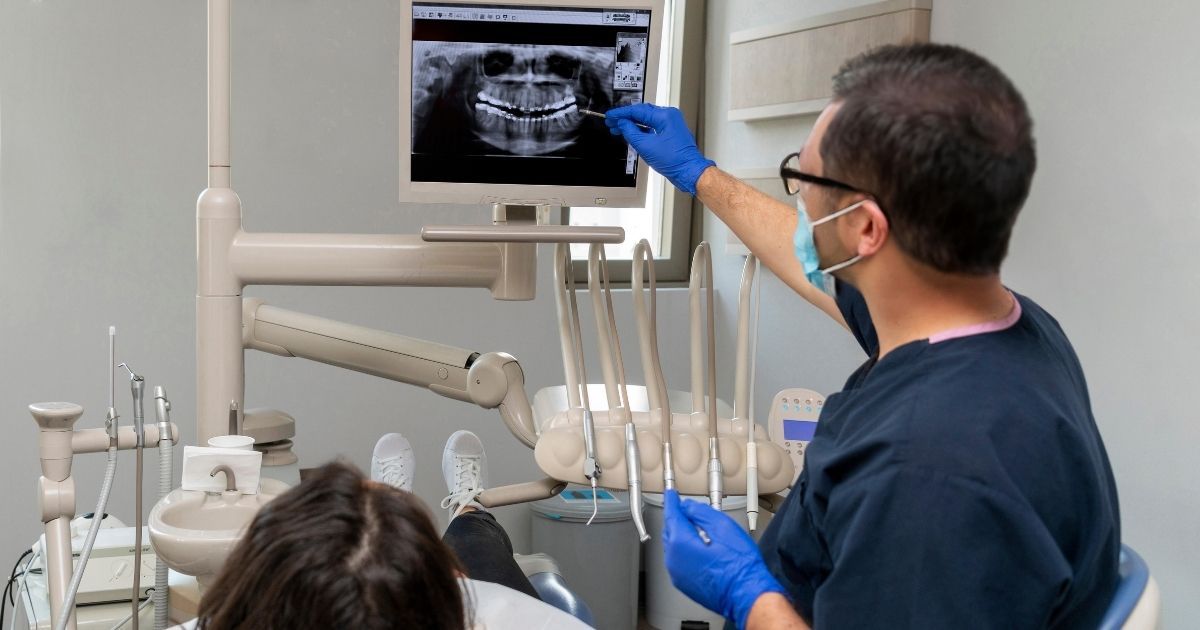Dental implant removal: is it possible?
If your dentist has recommended treatment for the replacement of several teeth, dental implants offer a long-term solution.
Unlike a veneer, a dental implant is ideal for people with broken or multiple missing teeth, however, you may be wondering if their removal is possible. We delve deeper into the dental implant removal options within this quick guide.
Reading time: 5 minutes

How dental implants work
- A dental implant acts as a permanent tooth replacement, offering a cost-effective alternative to treatments on individual teeth. It involves oral surgery to plant a tooth and root system into the mouth, held in place by a screw mechanism.
- A secondary benefit is that implants can also be used to hold in a prosthesis – otherwise known as bridges or dentures. This is ideal for those whose natural teeth are not healthy enough to ‘anchor’ in the prosthesis. The implant fuses with the bone in a process called osseointegration.
Can dental implants be removed?
In a healthy procedure, the implant fuses with the surrounding bone to form a permanent anchor in the mouth. Generally, we can expect a 90 to 95% success rate for 10-year periods. In rare cases, failed dental implants may need removal.
Case 1: Early implant failures
After your implant surgery, your oral surgeon will recommend check-ups in the first few months. At this stage, your surgeon can inspect the implant site and look for potential issues.
Most commonly, implants fail in the early months if there has been too much movement in the healing process. In other cases, there may be an infection or the implant may not have fused correctly to the jawbone.
Case 2: Late failures
A dental implant failure is classed as ‘late’ anywhere from a year after the surgery. This may happen to osseointegrated implants, which have already moulded with the bone. Patients could have infections such as peri-implantitis, which causes inflammation in the soft tissues.
The tooth may have suffered an impact or too much force, or the implant might have become loose. In both cases, explantation (removal) is possible, but the removal process is different.
How is a dental implant removed?
Dental implant removal techniques vary depending on the stage of the failure. These two main techniques are:
- Trough or trephine bur: This is a cutting device that cuts around 1mm of bone tissue to loosen and remove the implant.
- Adapter: This involves a reverse torque process whereby enough pressure loosens the implant without needing to cut tissue.
If the bond is too strong, this second option isn’t always feasible. If it is possible, there is no bone loss and a new implant replacement can be installed straight away.
Stage 1: Dental crowns
The first part of the procedure removes the crown. The dental crown is a cap that attaches to a tooth or dental implant.
Stage 2: Dental bridges/abutments
The second stage removes the dental bridge. There are many different types of dental bridges, and their role is to connect the crown to the teeth. An ‘abutment tooth’ is a natural tooth with a crown attached to support fake teeth around it.
Stage 3: Implant removal
With the bridges removed, the surgeon finally extracts the screw mechanism within the bone itself. They will then inspect the area to see if you need bone grafts to replace any lost tissue.
Implant removal is not a painful dentistry procedure. It involves anaesthetic and the most that patients will feel is heat if a trough bur is used.

Dental implant removal costs in the UK
The cost of this implant treatment generally starts at around £250 per tooth in the UK. There may be other implant treatments involved, such as surgery for peri-implantitis. This could start at around £600.
So, can dental implants be removed cost-effectively? There are two main factors that affect the pricing:
Factor 1: Stage of the implant failure
If an implant dentistry specialist detects a problem early on, this may be easier to fix. Your surgeon may not need to cut through bone tissue and there may not be any fusion, which makes removal easier. On the other hand, if the damage has progressed to an infection or you need a bone graft, this will push costs up.
Factor 2: Quality of the implant surgery
A common reason for the removal of dental implants is inadequate treatment in the first place. Your surgeon may not have asked you sufficient questions about your oral health. For example, if you have a history of gum disease, you may not be an ideal candidate.
Secondly, if the implants themselves are poor quality, they may break. Titanium implants are strong but can be affected by chewing and trauma. Poor implant placement may increase the chances of your body rejecting it.
Removable vs non-removable dental implants
You don’t always need to go for the permanent dental implant solution. While these are technically removable, they’re designed to be permanent and are ideal for those with periodontal damage that affects multiple teeth.
The purpose of a ‘non-removable’ dental implant is to hold a prosthesis (a bridge or denture) in place. They are perfect if you have no natural or healthy teeth left.
Removable alternatives are known as dentures or bridges. Equally, these can be attached to implants permanently, but you can choose a removable option. A set of dentures or bridges forms a row of artificial teeth. This sits between your natural teeth and stays in place with suction or adhesives.
While this option is easier to clean and cheaper, it’s also more likely to slip out of place.
Can dental implants be replaced by dentures?
Dental implants cannot be replaced by dentures, but dentures can be replaced by dental implants. While dentures are usually removable, they can be held in place by implants. This is ideal if you’re suffering damage to multiple teeth.
The only way to replace a dental implant would be to remove the old one and install a new one. This should not be necessary for 20 to 30 years, and you can prolong its life by practising good oral hygiene. Remember to brush twice a day, floss once a day and use antibacterial mouthwash.